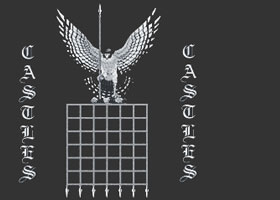CrenellationsPurpose of the Crenellations
The purpose of the Crenellations was to provide a fighting platform and good vantage point from which soldiers launched arrows. The crenellations also provided defenders with a solid defence to hide behind when they were not launching arrows from the gaps in between the stone battlements. The gaps in the crenellations ( the crenels) would also have temporary wooden shutters offering additional protection during siege warfare. Attackers would scale the castle wall and scaling ladders had hooks designed to fit over the crenels. Origin, Meaning of the word 'Crenellations'
The Origin and Meaning of the word 'Crenellations' derives from French word 'creneler' which means to furnish with battlements - diminutive of 'cren' meaning notch or cranny Introduction of the Crenellations - Norman Castles
The Crenellations were introduced with Norman castles during the Medieval period 1066 - 1154 Crenellations - Part of a Norman Castle
The Normans introduced the wooden Motte and Bailey Castle to England following their victory at the Battle of Hastings in 1066. The Norman timber Motte and Bailey castles were quickly replaced by permanent stone Norman castles. The Crenellations feature in the castles built by the Normans and this feature continued in the later Medieval Castles. | 
